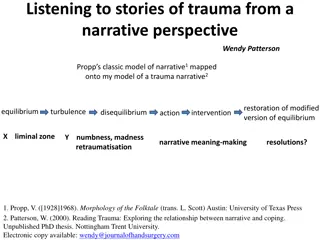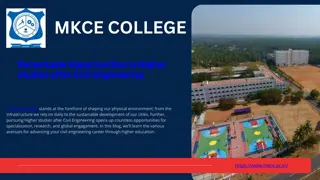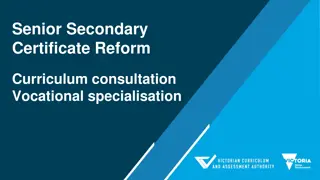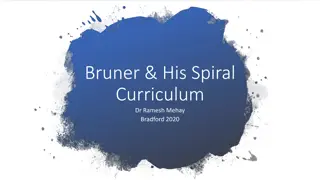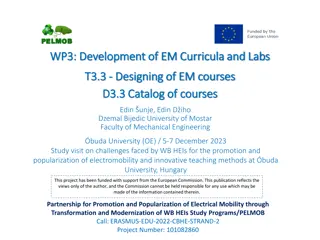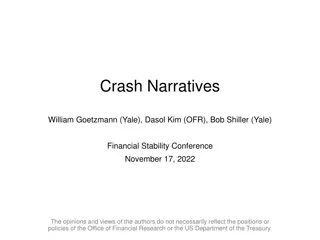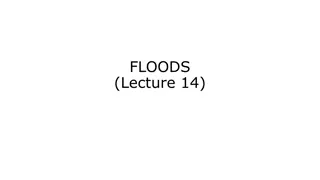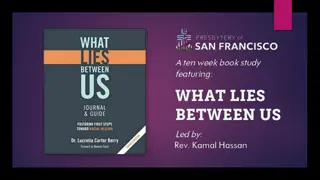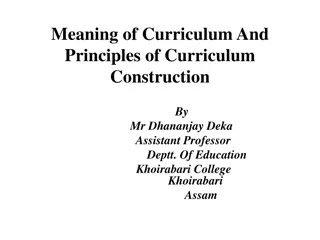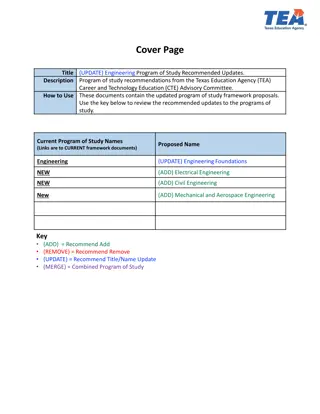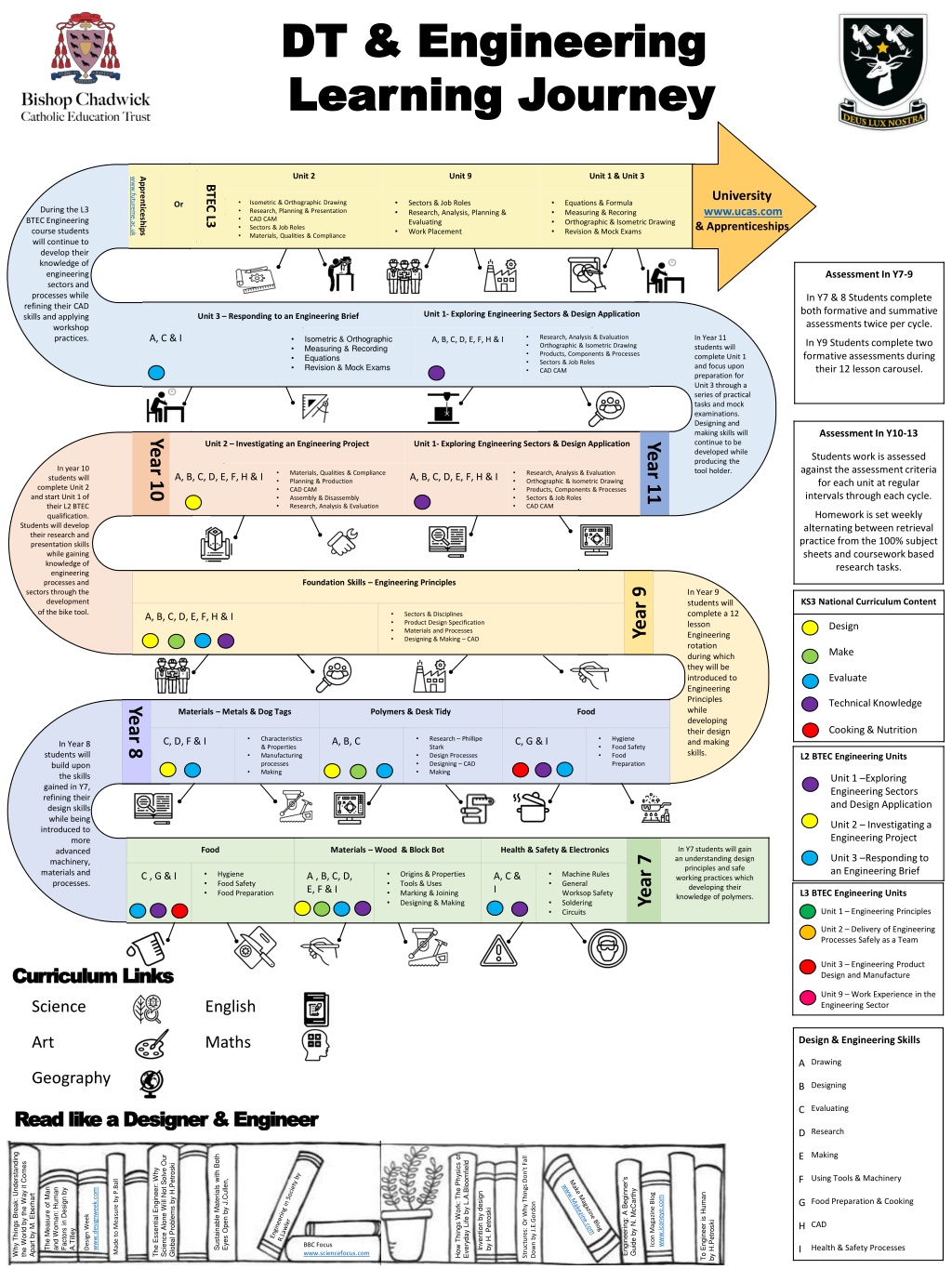
Engineering Learning Journey: Sectors, Processes, and Design Application
Explore an in-depth learning journey in Engineering, focusing on sectors, processes, CAD skills, job roles, materials, and compliance. Develop practical skills, knowledge of engineering principles, and engage in assessments to enhance understanding.
Download Presentation

Please find below an Image/Link to download the presentation.
The content on the website is provided AS IS for your information and personal use only. It may not be sold, licensed, or shared on other websites without obtaining consent from the author. Download presentation by click this link. If you encounter any issues during the download, it is possible that the publisher has removed the file from their server.
E N D
Presentation Transcript
DT & Engineering DT & Engineering Learning Journey Learning Journey Unit 2 Unit 9 Unit 1 & Unit 3 Apprenticeships www.futureme.ac.uk BTEC L3 University www.ucas.com & Apprenticeships Isometric & Orthographic Drawing Research, Planning & Presentation CAD CAM Sectors & Job Roles Materials, Qualities & Compliance Sectors & Job Roles Research, Analysis, Planning & Evaluating Work Placement Equations & Formula Measuring & Recoring Orthographic & Isometric Drawing Revision & Mock Exams Or During the L3 BTEC Engineering course students will continue to develop their knowledge of engineering sectors and processes while refining their CAD skills and applying workshop practices. Assessment In Y7-9 In Y7 & 8 Students complete both formative and summative assessments twice per cycle. Unit 1- Exploring Engineering Sectors & Design Application Unit 3 Responding to an Engineering Brief A, C & I Research, Analysis & Evaluation Orthographic & Isometric Drawing Products, Components & Processes Sectors & Job Roles CAD CAM In Year 11 students will complete Unit 1 and focus upon preparation for Unit 3 through a series of practical tasks and mock examinations. Designing and making skills will continue to be developed while producing the tool holder. Isometric & Orthographic Measuring & Recording Equations Revision & Mock Exams A, B, C, D, E, F, H & I In Y9 Students complete two formative assessments during their 12 lesson carousel. Assessment In Y10-13 Year 10 Unit 2 Investigating an Engineering Project Unit 1- Exploring Engineering Sectors & Design Application Year 11 Students work is assessed against the assessment criteria for each unit at regular intervals through each cycle. In year 10 students will complete Unit 2 and start Unit 1 of their L2 BTEC qualification. Students will develop their research and presentation skills while gaining knowledge of engineering processes and sectors through the development of the bike tool. Materials, Qualities & Compliance Planning & Production CAD CAM Assembly & Disassembly Research, Analysis & Evaluation Research, Analysis & Evaluation Orthographic & Isometric Drawing Products, Components & Processes Sectors & Job Roles CAD CAM A, B, C, D, E, F, H & I A, B, C, D, E, F, H & I Homework is set weekly alternating between retrieval practice from the 100% subject sheets and coursework based research tasks. Foundation Skills Engineering Principles Year 9 In Year 9 students will complete a 12 lesson Engineering rotation during which they will be introduced to Engineering Principles while developing their design and making skills. KS3 National Curriculum Content Sectors & Disciplines Product Design Specification Materials and Processes Designing & Making CAD A, B, C, D, E, F, H & I Design Make Evaluate Technical Knowledge Year 8 Materials Metals & Dog Tags Polymers & Desk Tidy Food Cooking & Nutrition Characteristics & Properties Manufacturing processes Making Research Phillipe Stark Design Processes Designing CAD Making Hygiene Food Safety Food Preparation C, D, F & I A, B, C C, G & I In Year 8 students will build upon the skills gained in Y7, refining their design skills while being introduced to L2 BTEC Engineering Units Unit 1 Exploring Engineering Sectors and Design Application Unit 2 Investigating a Engineering Project more In Y7 students will gain an understanding design principles and safe working practices which developing their knowledge of polymers. Food Materials Wood & Block Bot Health & Safety & Electronics advanced machinery, materials and processes. Unit 3 Responding to an Engineering Brief Year 7 Hygiene Food Safety Food Preparation Origins & Properties Tools & Uses Marking & Joining Designing & Making Machine Rules General Worksop Safety Soldering Circuits C , G & I A , B, C, D, E, F & I A, C & I L3 BTEC Engineering Units Unit 1 Engineering Principles Unit 2 Delivery of Engineering Processes Safely as a Team Unit 3 Engineering Product Design and Manufacture Curriculum Links Curriculum Links Unit 9 Work Experience in the Engineering Sector Science English Art Maths Design & Engineering Skills A Drawing Geography B Designing Read like a Designer & Engineer Read like a Designer & Engineer C Evaluating D Research Why Things Break: Understanding E Making Sustainable Materials with Both How Things Work: The Physics of Science Alone Will Not Solve Our Structures: Or Why Things Don t Fall the World by the Way it Comes Everyday Life by L.A.Bloomfield Global Problems by H.Petroski The Essential Engineer: Why F Using Tools & Machinery Engineering: A Beginner's Eyes Open by J.Cullen, Made to Measure by P.Ball The Measure of Man and Woman: Human Factors in Design by www.designweek.com Guide by N. McCarthy Icon Magazine Blog Invention by design To Engineer is Human Apart by M. Eberhart www.iconeye.com G Food Preparation & Cooking Down by J.E.Gordon by H. Petroski Design Week by H.Petroski H CAD A.Tilley BBC Focus www.sciencefocus.com Health & Safety Processes I
DT & Engineering Learning Journey The ideal engineer is a composite He is not a scientist, he is not a mathematician, he is not a sociologist or a writer, but he may use the knowledge and techniques of any or all of these disciplines in solving engineering problems. - N.W. Dougherty DT & Engineering Narrative - The 7 Year Journey Throughout KS3 and KS4 students study a range of design and engineering disciplines which cover the key concepts including designing, making, evaluating, technical knowledge and food and nutrition . All units have time dedicated to career progression in the design, engineering and manufacturing industries in order to ensure students are aware of how the skills they are learning are used in the wider world. This also includes links with STEAM ; which is an important aspect of providing a broad and balanced curriculum. The key concepts are revisited regularly as students progress each year, with new concepts and advanced processes being introduced at KS4 and KS5 to allow further development for those opting to continue with their Engineering studies at BTEC Level 2 and 3. Literacy and Numeracy skills will be used regularly across the 7 year journey in the form of oracy, extended writing tasks, evaluation, analysis and measuring. Y7 Health & Safety, Electronics, Materials & Properties ( Wood) and Cooking & Nutrition In Y7 students are introduced to key health and safety aspects of DT & Engineering. Understanding the safe use of tools and machinery is studied in depth to ensure students can be safe while in the workshop. Students will learn about electronics and spend time learning to solder and producing their own electrical circuit. Students will then be introduced to wood, studying the different types and its properties and gaining knowledge about its uses and ways in which they can be engineered and manipulated. Sustainability, recycling and reusing materials will also be covered. Students will apply design and making skills while producing their own recycled block bots, while ensuring they adhere to the health and safety guidance. Students will also be introduced to food hygiene, nutrition and food preparation. Key skills such as slicing, combining and weighing will be gained in addition to food storage rules and hygiene guidelines. A selection of 3 healthy recipes will be prepared by students with the aim of promoting good nutrition and independence in the kitchen. Literacy and oracy skills are routinely built upon while discussing both their own work and the work of others. Y8 Metals , Polymers and Cooking & Nutrition In Year 8 students will build upon the skills gained in Y7, revisiting the theme of materials and being introduced to more complex materials including polymers and metals as well as more advanced food preparation skills. Design and making skills are built upon in addition to gaining new skills when working with tools and machinery as well as CAD software. While being introduced to metals students will gain knowledge about the properties and uses of the material as well as manufacturing processes. While working with metals students will produce a dog tag allowing them to build proficiency in cutting, filing, shaping and stamping while working on their product. Polymers will be introduced and design skills will again be used in order to develop a desk tidy. Creativity, research skills and knowledge of the CAD software are key elements of the design process which students will experience. Health and safety practices and the correct use of materials and tools are key areas which will be continuously revisited. Finally students will revisit cooking and nutrition, with the introduction of new skills including dicing, frying and baking while revisiting basic hygiene and food handling guidelines. Literacy and oracy skills are continually developed through the form of class discussions and smart tasks. Y9 Engineering ( Carousel) Pupils in year 9 will complete a 12 lesson engineering carousel. This will involve them consolidating and extending their learning from years 7 and 8, applying key engineering and design concepts. Students will develop and produce their own metal & wood bottle opener which will provide them with the opportunity to work with new machinery and CAD software while developing their technical skills and knowledge. Research skills will be developed and literacy will be used while evaluating the engineering, design and manufacturing processes used to develop the finished product. Y10 Unit 1 & 2 Pupils start year 10 by extending their skills gained across ks3. Students will complete the first of their BTEC units, Unit 2 Investigating an Engineered Product, further developing their ability to research and analyse products and well as building upon their technical skills while in the workshop. Students will design and build their own multi function bike tool using CAD software and specialist tools and machinery. Students will then be introduced to Unit 1 Exploring Engineering Sectors and Design Application for which they will investigate an engineered product in depth, researching engineering sectors, organisations and job roles. Literacy and oracy will be developed continuously through class discussions, report writing and evaluation tasks. Y11- Unit 1 & 3 Pupils will begin year 11 by completing their Unit 1 assignment, investigating an existing engineered product and developing a tool storage system using CAD software and CAM processes. Report writing, analysis and evaluation skills will continue to feature heavily in their learning, providing continuous development of literacy skills. Precise measuring of products and their components as part of the design and manufacturing process will provide opportunity to develop numeracy skills. Students will then focus upon Unit 3- Responding to an Engineering Brief, completing a range of tests and experiments and recording their findings. This unit will allow students to combine their engineering knowledge with mathematics and physics principles. A series of controlled experiments and a formal written exam will conclude the unit. Y12 & 13 Unit 1, 2, 3 & 9 In year 12 students will be introduced to Unit 1 and 2 simultaneously. Unit 1- Engineering Principles consist of students studying the maths and physics principles of engineering and applying them to engineering contexts. Unit 2 Delivery of Engineering Processes Safely as a Team will be completed separately and will provide students with the opportunity to work as part of a team while investigating engineering processes, sectors and products. Presentation, report writing, analysis, evaluation and research skills will all be developed allowing students to build upon the skills and knowledge gained from Y7-11. Unit 9 Work Experience in the Engineering Sector will see students investigating an engineering sector and the processes used to manufacture their product or provide a service. Students will then complete 2 weeks of work experience within two different engineering based companies, reporting on their experience and the structure of the company as well as working practices and health and safety procedures followed. Finally students will complete Unit 3 Engineering Product Design and Manufacture which will involve a series of practical tasks alongside detailed recording and the application of mathematical and physics principles. This unit alongside Unit 1 will be concluded with a formal assessment in addition to 8 hours of controlled assessment.
ART Assessment Map: ART Assessment Map: Year /Cycle Sub Concept: Curriculum assessed: Assessment Type Spot the Hazard Formative Year 7 Cycle 1 Health & Safety and Electronics Baseline Assessment Summative Extended Writing Summative Wood Materials and Processes Formative Workshop Practical Blockbot Design and Making Process Formative Materials & Processes Making & Modelling Year 7 Cycle 2 Workshop Practical - Blockbot Final Outcome Summative Wood Materials and Processes Summative Extended Writing Summative Food Preparation and Hygiene Formative Cooking Practical Vegetable Couscous Formative Year 7 Cycle 3 Food & Nutrition Cooking Practical French Bread Pizza Formative Cooking Practical Bolognaise Formative Food Preparation and Hygiene Summative Formative Metals Properties and Characteristics Summative Metals Properties and Characteristics Materials & Processes Making & Modelling Year 8 Cycle 1 Summative Extended Writing Formative Workshop Practical Dog Tags Design and Making Process Summative Workshop Practical Dog Tags Final Outcome Summative Extended Writing Formative Polymers Properties and Characteristics Materials & Processes - Polymers Summative Polymers Properties and Characteristics Year 8 Cycle 2 Summative Extended Writing Formative Workshop Practical Phone Holder Design and Making Process Summative Workshop Practical Phone Holder Final Outcome Food Preparation and Hygiene Formative Cooking Practical Tortilla Pizza Formative Year 8 Cycle 3 Food & Nutrition Cooking Practical Chicken Fajitas Formative Cooking Practical Vegetable Fried Rice Formative Food Preparation and Hygiene Summative
Year /Cycle Sub Concept: Curriculum assessed: Assessment Type Engineering and Manufacturing Processes Formative Year 9 Cycle 1 Materials & Processes CAD Skills Formative Formative Unit 2A Product Disassembly Unit 2A Product Disassembly Summative Year 10 Cycle 1 Unit 2A Summative Extended Writing Formative Unit 2A Product Disassembly Summative Unit 2A Product Disassembly Formative Unit 2B Investigating an Engineered Product Summative Unit 2B Investigating an Engineered Product Year 10 Cycle 2 Summative Extended Writing Unit 2B Formative Unit 2B Investigating an Engineered Product Summative Unit 2B Investigating an Engineered Product Formative Unit 2C Making Task Spanner Unit 2C Making Task Spanner Summative Year 10 Cycle 3 Summative Extended Writing Unit 2C Unit 2C Making Task Spanner Formative Unit 2C Making Task Spanner Summative
Year /Cycle Sub Concept: Curriculum assessed: Assessment Type Unit 1A- Products, Sectors and Organisations Formative Unit 1A- Products, Sectors and Organisations Unit 1A Summative Extended Writing Summative Year 11 Cycle 1 Unit 3 Mock 1 Summative Unit 1B Unit 1B Engineering Skills and Design Solutions Formative Unit 1B Engineering Skills and Design Solutions Summative Unit 3 Manufacturing Processes & Following a Brief Formative Unit 3 Mock 2 Summative Unit 3 Manufacturing Processes & Following a Brief Formative Year 11 Cycle 2 Unit 3 Unit 3 Attempt 1 February Examination Window Summative Unit 3 Manufacturing Processes & Following a Brief Formative Unit 3 Mock 3 Summative Unit 3 Mock 4 Summative Year 11 Cycle 3 Unit 3 Manufacturing Processes & Following a Brief Unit 3 Formative Unit 3- Attempt 2 June Examination Window Summative BTEC Level 3 Summary of Assessment: Unit 2 Delivery of Engineering Processes Safely as a Team Cycle 1 & 2 Y12 Coursework progress is monitored via one to one tutorials and verbal feedback. Submissions are reviewed and returned for re-submission within a 2 week window as per exam board guidance. Unit 9 Work Experience in the Engineering Sector Cycle 3 Y 12 and Cycle 1 Y13 Coursework progress is monitored via one to one tutorials and verbal feedback. Submissions are reviewed and returned for re-submission within a 2 week window as per exam board guidance. Students complete two weeks of work experience at two different engineering establishments as part of this unit. Unit 1 Engineering Principles Y12 & Y13 Progress is reviewed and monitored via one to one tutorials, verbal feedback and mock assessments. Mock Examinations are conducted at regular intervals throughout the course. Students complete exam board assessments in January and June of Y13 Unit 3 Engineering Product Design and Manufacture Cycle 1, 2 & 3 Y13 Progress is reviewed and monitored via one to one tutorials, verbal feedback and mock assessments. Mock Examinations are conducted at regular intervals throughout the course. Students complete exam board assessments in January and June of Y13







